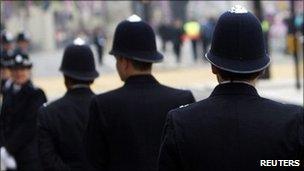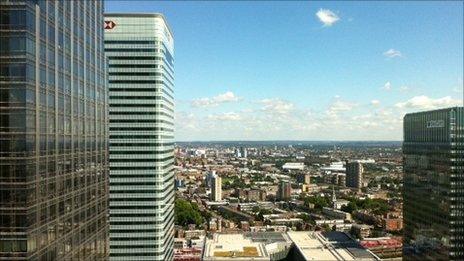What do we value about the police?
- Published
- comments

Crime rates have fallen in recent years
The home secretary was asked today: "What do we want the police to do?"
Theresa May replied: "There is a need for us, in a sense, to have that discussion. These are not easy issues but you are right to highlight it." Indeed.
She talked vaguely of the police being seen as "the last resort" for every social ill, of needing to think about which agency should be responsible for community problems.
But I did wonder whether she had rather ducked the bigger question - not so much about what they should do as what we think the police are for.
It was the perfect location for blue-sky thinking and horizon scanning - a conference on Value for Money in Policing held on the 30th floor of a Docklands skyscraper on a bright summer's morning.
We were in the offices of city law firm Clifford Chance at an event organised by the think tank Reform and sponsored by the management consultancy firm KPMG.
This is the company chief constables keep these days when considering the efficiency of police forces in England and Wales.

Do we need to do some blue-sky thinking about the police?
Along with lawyers, policy wonks and consultants, the room was packed with seasoned old coppers eagerly discussing "comparative assessment tools", "turning data into insight" and "mainstreaming".
Many police chiefs are now fluent in management-speak, happily swapping notes on skills competency, leadership and process improvement- and hurrah for that.
It makes absolute sense for public servants to be up to speed on how their operations can use tax-payers' money most effectively. But I noted a reluctance to engage with a central question about Value for Money in Policing - what is it that we value?
Robert Peel famously said that the test of police efficiency is the absence of crime and disorder. On that basis, and taking account of the evidence from both recorded police crime figures and the British Crime survey, they have been getting increasingly efficient for the past 16 years.
But, of course, that's not how we measure police efficiency because, if we are honest, we don't actually believe that crime, or the absence of it, is entirely or even mainly down to the police.
Crime has fallen in pretty well every Western developed nation over the same period irrespective of criminal justice or policing policies.
Criminologists are still scratching their heads as to why that is but they suspect it may have something to do with the global economy.
It might be a factor of stable democracy. Perhaps it is linked to improved education systems. It could be a consequence of the collapse in the second-hand price of TVs and better locks. And it may, in part, at least, be down to intelligent policing - new technology and more sophisticated approaches to crime prevention and investigation.
But the idea that we can draw a line between crime levels and police efficiency is far too simplistic. When crime was rising throughout the 60s, 70s and 80s, people didn't say it was the police's fault for not being cleverer. They blamed delinquent youth or unemployment or the collapse of traditional values.
Equally, during the last 16 years when crime has been falling, people haven't said it is down to brilliant detective work or the sterling efforts of patrolling constables. In truth, they haven't even been convinced that crime is falling and still talk about social breakdown being to blame for lawlessness.
So, how should we measure value for money in the police? The last government originally tried to measure efficiency against a whole panoply of targets: response times, arrests and convictions, writing letters to victims, clear-up rates, time spent on the beat rather than filling forms - a huge range of measures.
Then, persuaded by the argument that actually all these targets were getting in the way and certainly not translating into people feeling safer, they scrapped that idea and went for a simple measure of public confidence.
Efficient policing is not simply about the absence of crime. In many people's minds it is about the absence of fear. Police constables are not just crime-fighters, they are social psychologists - looking for ways to calm an anxious citizenry.
When the coalition came to power, a few targets remained within the policing pledge - promises to treat people with dignity and respect, to be efficient in answering calls, to spend more time on the beat - but even these have now been ditched.
The home secretary repeated today what she told police at the time: "In scrapping the confidence target and the policing pledge, I couldn't be any clearer about your mission. It isn't a 30-point plan, it is to cut crime: no more and no less."
Your mission is to cut crime. No more and no less. It is a clear, straightforward and popular soundbite. But I wonder whether that really is what the public expects from the local constabulary, no more and no less.
The criminal justice system has come to be regarded, for better of worse, as the mechanism for sorting out our social angst as well as catching Burglar Bill.
Why are the police being encouraged to do more to tackle anti-social behaviour as well as criminal activity? Because concern about ASB is proxy for dread about the state of our society.
Why do we demand bobbies on the beat even when we know it is an incredibly inefficient way of catching criminals? Because the sight of uniforms reassures us.
There's another point here too. If the mission is to cut crime, no more and no less, do we blame chief constables or elected commissioners if poor bank security results in credit card fraud going through the roof? Or if the council's closure of a local youth club means more teenagers hanging around and causing mischief?
If we are going to debate value for money, we have to decide what we value. But we dodge that question, and so VFM becomes a conversation about IT convergence, procurement strategy, and data transparency.
It is about merging back-office functions and rostering, and pay rates. It is about operational efficiency - about saving money.
It is quite right to ensure that we don't squander scarce resources in delivering public services. But before we decide how to do the same stuff more efficiently, we ought to decide whether we are doing the right stuff. We should agree what the police are for.
Of course, we need them to respond to and investigate illegality. Of course, we need them to help prevent crime. Of course, we need them to help keep order. But what is the measure of success?
Until we understand value, how can we tell whether we are getting our money's worth?